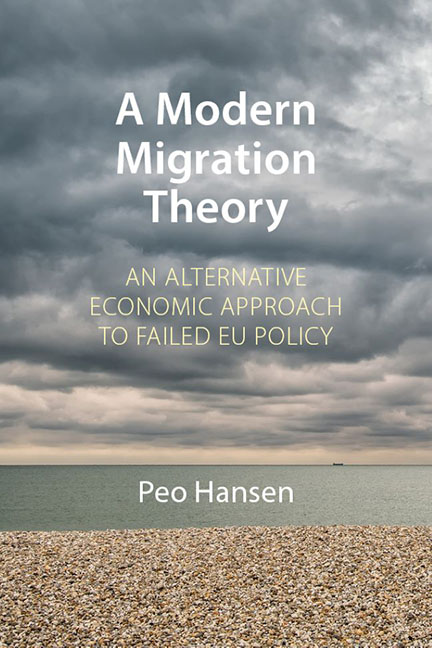Book contents
- Frontmatter
- Dedication
- Contents
- Preface and acknowledgements
- Foreword
- 1 Migration: the “mother of all problems”
- 2 The fiscal impact of migration
- 3 A modern migration theory
- 4 Demography, security and the shifting conjunctures of the European Union’s external labour migration policy
- 5 Labour migration in a sound finance policy logic
- 6 Why EU asylum policy cannot afford to pay demographic dividends
- 7 “We need these people”: refugee spending, fiscal impact and refugees’ real bearing on Sweden’s society and economy
- 8 Conclusion
- Bibliography
- Index
7 - “We need these people”: refugee spending, fiscal impact and refugees’ real bearing on Sweden’s society and economy
Published online by Cambridge University Press: 20 December 2023
- Frontmatter
- Dedication
- Contents
- Preface and acknowledgements
- Foreword
- 1 Migration: the “mother of all problems”
- 2 The fiscal impact of migration
- 3 A modern migration theory
- 4 Demography, security and the shifting conjunctures of the European Union’s external labour migration policy
- 5 Labour migration in a sound finance policy logic
- 6 Why EU asylum policy cannot afford to pay demographic dividends
- 7 “We need these people”: refugee spending, fiscal impact and refugees’ real bearing on Sweden’s society and economy
- 8 Conclusion
- Bibliography
- Index
Summary
For a few short months in 2015 Germany and Sweden approached their large refugee reception as if this was the right thing to do. In doing so, the two countries broke one of the European Union's core taboos, namely that of saying “Yes” – or, at least, not emphatically “No” – to the admission of refugees. But, in initially agreeing to receive a significant number of refugees, this also meant that Germany and Sweden had to violate another of the Union's principal taboos (at least prior to Covid-19), namely that of agreeing to fiscal expansion. Germany and Sweden's massive spending (starting in 2015) created an MMT, or Keynesian, laboratory environment. The two EU governments that were arguably the most wedded to the doctrine of sound finance thus felt compelled to practise, de facto, functional finance: they spent to resolve a real problem instead of creating a problem by trying to guarantee fiscal balance – or, as in the Swedish case, surplus – at the end of the year. Both governments were soon to agonize over this issue vociferously, bracing their citizens for potentially perilous deficits, spending cuts and borrowing. Although both governments would subsequently revert to sound finance, this did not change their functional approach during the period in question.
In discussing these issues further this chapter will mainly focus on the Swedish case, just briefly commenting on Germany. The first part takes a close look at the fiscal impact of Sweden's increased spending on refugee reception and integration in the period from 2015 to 2017. What really happened? Did the spending lead to the allegedly dangerous deficits and borrowing that the government and the economic expertise had predicted? How did the government and economists reason when they made their predictions and forecasts; and why did they routinely present these as foregone conclusions and not as the predictions and forecasts they were?
The second part of the chapter then goes on to examine further the real resource impact of Sweden's refugee migration, an exploration that I began in Chapter 3.
- Type
- Chapter
- Information
- A Modern Migration TheoryAn Alternative Economic Approach to Failed EU Policy, pp. 139 - 170Publisher: Agenda PublishingPrint publication year: 2021



